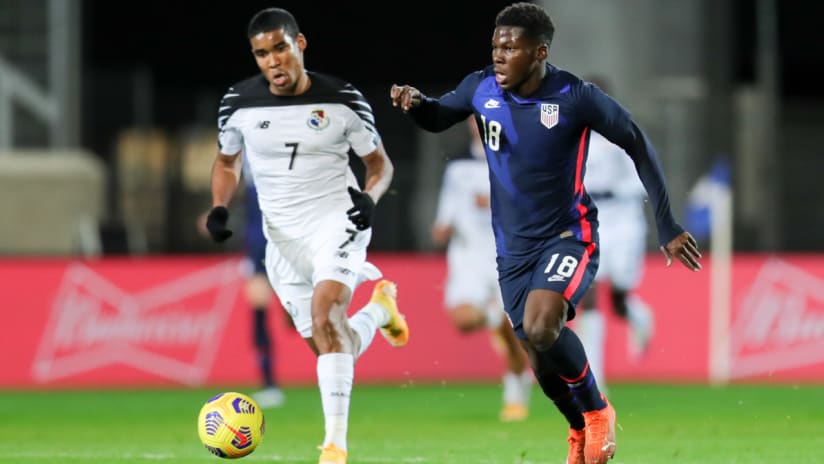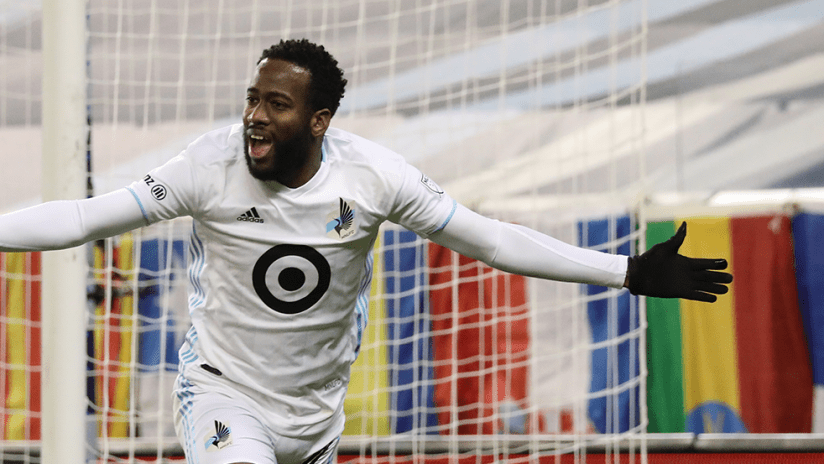Oh, so you wanted goals, huh?
After Thursday’s bright but barren draw with Wales, the US men’s national team responded with a scoring barrage against Panama, thumping a subdued Canaleros side 6-2 at Stadion Wiener Neustadt in Austria. All in all, not a bad way to cap a fruitful November camp for Gregg Berhalter’s band of fresh-faced talents.
Here’s four observations from the big friendly win.
Can’t spell Yunus without U.S.
We’ve already talked a great deal about the fearsome Tyler Adams-Weston McKennie-Yunus Musah midfield triangle since their impressive display in Wales, so I won’t belabor that point right now. Let’s hand out some specific plaudits to the newest of the three, since he was arguably even more eye-catching on Monday.
Musah was excellent in both matches, showcasing an advanced soccer IQ, a high-capacity engine and the personality and technical excellence to power his team in both directions, most strikingly when surging from defense into attack. He and McKennie set the tone for both the match and their team and should be considered foundational pieces from here on out.
Even by the wet-behind-the-ears standards of the current US group, what a phenomenon Musah is at just 17 years of age — and what a merry chase for his international allegiance he’s kicked off over the past week.
Musah already played for England at youth level and Three Lions manager Gareth Southgate has signaled his intent to stay in pursuit of his services despite the youngster’s head-turning stint with the Americans. Berhalter will surely seek to cap-tie him at the earliest opportunity, which at this point looks to be the Concacaf Nations League semifinal vs. Honduras in June. Let’s see what transpires between now and then.
Out-and-out strikers: Stock rising
When you’re a No. 9-type frontrunner like Niko Gioacchini or Sebastian Soto and you see your coach set up his XI not only without you, but without anyone at all in your primary role (yes, I’m talking about the Sebastian Lletget false 9 look), it presents a challenge of sorts.
We can safely say that both strikers got the message and seized the opportunities offered to them against Panama. Both were razor-sharp in sniffing out and finishing chances, and both got involved in other ways with hard work and combination play around the box. We saw more of Gioacchini because he got the start, and the Caen forward just about did everything he could to make an impression… well, except for that penalty kick attempt.
“It gave us what I think we were missing a little bit in Wales,” said Berhalter of Gioacchini afterwards. “It was good to have him.”
Gioacchini himself was measured but optimistic at the end of what he called "a week that I'll never, ever, ever forget":
"I always look at the glass-half-empty part of my performance first. So let's say I remember what I've done wrong. And I feel like I have a lot to improve on. My first impression, I don't think was a bad one. But I could have done way better for myself, been more available to the midfield, even to the center backs, in the box. I still had areas where I felt like, you should have been five steps ahead of where you were, even two steps ahead. So it's always something to review and to remember. But still, two goals is not easy for anyone."
Center backs: Stock dropping
Matt Miazga and Tim Ream seem to rank pretty highly in Berhalter’s estimation of his defensive corps and I don’t think we’ve seen the last of either of them by any means. But the biggest winner from their performance against Panama was John Brooks, who got the night off.
Miazga and Ream went to sleep on the opening goal, letting Jose Fajardo slip past them for a free header that put the USMNT in an early hole. And then they zoned out again in the late going, allowing Fajardo to exploit their positioning again for another glorious look that he did not spurn. Those kind of errors will be far more costly against superior opposition, and/or in higher-stakes situations.
Whereas Brooks was authoritative and assured on Thursday, we exit this international window with new questions about who should partner him in an first-choice lineup.
A necessary matchup
We can justifiably say Panama were poor, and many are already doing so online. It’s nonetheless a smart move to line them up to play this match.
This predominantly European-based US squad will have limited exposure to the kind of Concacaf adversaries they’ll meet in big games next year, so some firsthand experience of it is vital, even when transplanted to an unfamiliar setting in Vienna’s exurbs. Some things just don’t translate fully when consumed on an iPad screen, like a Panamanian’s studs artfully applied just after the referee’s gaze has shifted elsewhere.
"I think we got a little bit of a taste of what the Concacaf teams will be like against us," noted Gio Reyna postgame.
Though this was a far-from-full-strength Canaleros team — their small nation’s player pool is inevitably shallower than most — they gave the young Yanks a dose of the rugged physicality and clever nastiness that have made them such a tough out in the region over the past decade or so, even as they themselves look to turn the page to a new era with a refreshed group. They'll have their claws sharpened when these sides meet in the coming months, and the USMNT best be ready.








